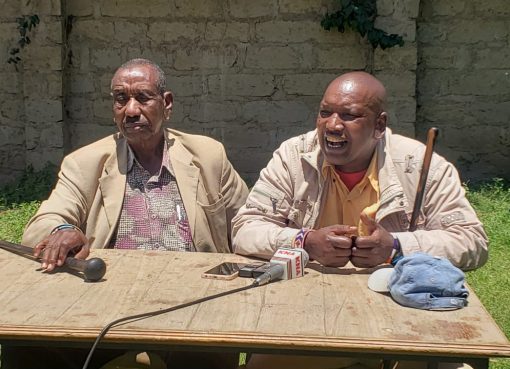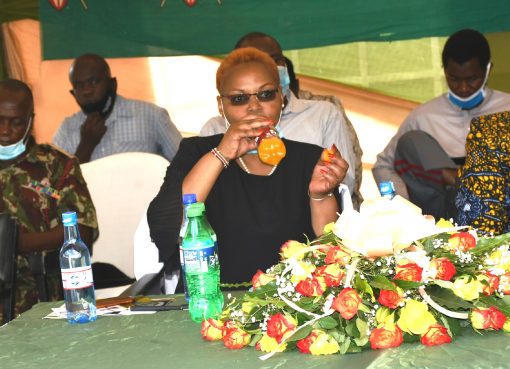The County Government of Nakuru is stepping up efforts to accelerate adoption of modern clean cooking technologies to mitigate effects of climate change and reduce cases of diseases caused by dirty fuels.
The County Executive Committee Member (CECM) for Water, Environment, Energy, Climate Change, and Natural Resources Dr. Nelson Maara said they were conducting a public awareness campaign on promoting clean cooking as a way of supporting the national government’s Clean Cooking Strategy formulated by the Ministry of Energy and Petroleum aimed at keeping Kenya on track to achieving its target of universal access to clean energy by 2028.
Dr. Maara further said that the devolved unit’s administration had prioritized the deployment of renewable energy technologies, including biogas systems, solar energy, and clean cooking solutions, especially in rural and peri-urban areas.
The CECM spoke after signing a Memorandum of Understanding (MoU) with 3E (Environment, Entrepreneurship, and Energy) group aimed at accelerating climate-smart agriculture, clean energy access, and green entrepreneurship initiatives towards enhancing food security and sustainable development in the region.
He was happy that through the collaboration with 3E group, over 95 dairy farmers in Molo Sub-County had benefited from capacity-building training and quality fodder production to boost milk production through practicing climate resilience agriculture, while in Subukia and Solai locations, the revitalization of coffee farming was on course after 6,600 coffee seedlings were distributed to local farmers.
The collaboration was now supporting environmental conservation through sustainable agricultural practices, while at the same time promoting income diversification.
“We aim to reduce overreliance on wood fuel, thereby promoting forest conservation and healthier living environments,” said the CECM.
He added that the partnership with 3E -Environment, Entrepreneurship, and Energy group was also fostering community empowerment through entrepreneurship by supporting innovation hubs and providing training and funding access for youth and women engaged in eco-friendly enterprises, which he said was in alignment with Governor Susan Kihika’s green growth agenda.
While appreciating the partnership’s efforts in bolstering Kenya’s Clean Cooking Strategy aimed at improving access to improved transitional and clean cooking solutions, Dr. Maara regretted that overreliance on traditional fires and traditional cook-stoves and fuels was one of the most pressing health and environmental problems that call for urgent action.
The World Health Organization identifies household air pollution as a global environmental risk, causing some 1.6 million premature deaths per year worldwide.
WHO also estimates that 84 percent of Kenyan households primarily rely on solid fuels such as wood, charcoal and crop residues that emit toxic fumes and contribute immensely to indoor pollution.
Dr. Maara voiced his appreciation to the County efforts of carrying out the ‘Clean Cooking Awareness Campaign’ in all the 11 Sub-Counties in collaboration with ‘Practical Action’ adding that the partnership will promote solutions that include climate friendly efficient biomass stoves and a fuel switch from solid biomass and kerosene to clean and environmentally friendly options.
These options, he elaborated, also include biogas, bioethanol, liquefied petroleum gas (LPG), solar photovoltaic (PV) and electric cooking.
“Modern cooking stoves are highly efficient and can reduce fuel use by up to 60 percent resulting in fewer emissions of greenhouse gases,” he explained.
Some 59 percent of households in Kenya use traditional fireplaces for cooking while only 30 percent have access to clean cooking solutions.
The Ministry of Health estimates that about 23,000 deaths in Kenya are attributed to household air pollution annually. Indoor pollution disproportionately affects women, girls and children who spend extended time looking for fuel and cooking meals thereby bearing the brunt of exposure to long hours of a smoky kitchen environment.
Dr. Maara stated that the partnership will be useful in positively influencing public knowledge, attitudes and social norms related to cooking behaviour in households with respect to climate friendly cooking solutions.
“Over 93.2 percent of rural households use wood-fuel as their primary fuel, while 30 percent of the population use Liquefied Petroleum Gas (LPG) with only 3 percent of households owning an electric cooking appliance,” he said.
Statistics from the Ministry of Environment, Climate Change and Forestry show that cooking contributes to 70 percent of the Greenhouse Gas emissions in Kenya.
Article 42 of the Constitution guarantees Kenyans the right to a clean and healthy environment achieved through legislative and other measures.
Dr. Maara observed that while some Kenyans know the negative impact of cooking smoke, many are not aware of how clean and efficient cook stoves and fuels can benefit them on a daily basis.
He stated the smoke from dirty fuel also contributes to a range of chronic illnesses and acute health impact such as early childhood pneumonia, emphysema, cataracts, lung cancer, bronchitis, cardiovascular disease, and low birth weight.
Additionally, Dr. Maara stated that as a country, Kenya has committed to reducing its greenhouse gases by 32 per cent by 2030.
Meanwhile, household cooking using firewood, charcoal and kerosene is a major contributor to Kenya’s greenhouse gas emissions, she added.
By Esther Mwangi





